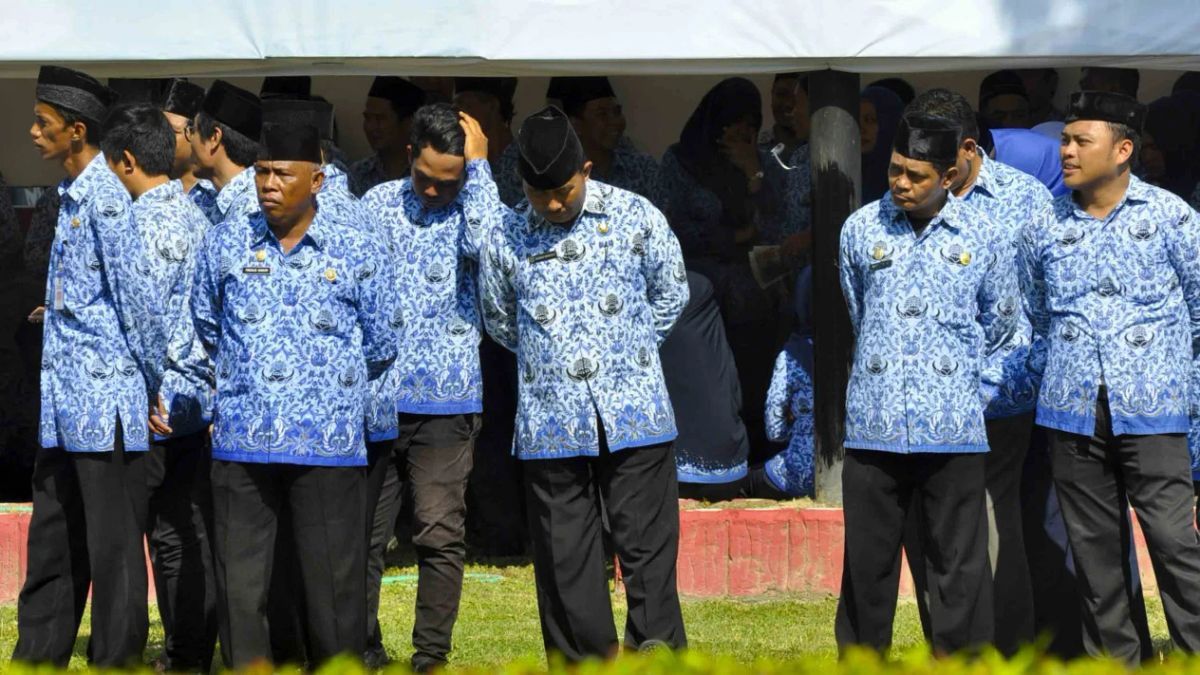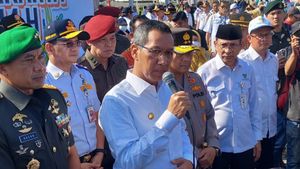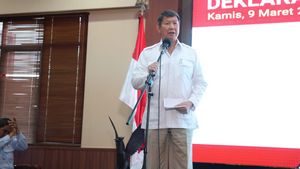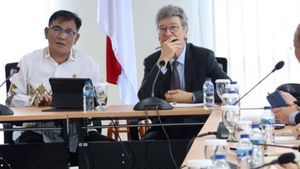The ratification of the State Civil Apparatus Law (UU ASN) is considered to be the support of the Indonesian House of Representatives to save honorary staff in the midst of the plan to eliminate non-ASN personnel. The DPR's move was also appreciated.
The statement was made by a Public Policy Expert, Trubus Rahadiansyah. According to him, the ratification of the ASN Law carried out by the DPR is proof that the legislative council absorbs the aspirations of the community, especially honorary staff.
"I think the DPR currently understands the urgency of this bill because discussions have also been carried out frequently, so there are no more words to delay. And the DPR knows that, then the President also asked for no layoffs. So yesterday it was ratified in my opinion," Trubus said, Thursday, October 5.
Trubus assessed that one of the main focuses of the ASN Law on non-ASN issues would be a legal umbrella for the arrangement of honorary staff, which amounted to more than 2.3 million people.
"I think the DPR is right, when the issue of honorary staff is already tight and it grabs the attention of the public, what will happen to honorary staff. So I don't think there is any rush, but the DPR through its function has answered anxiety in the community, especially on the issue of honorary staff," he explained.
The man who serves as General Chair of the Indonesian Policy Analyst Association explained that the ASN Law also provides opportunities for equality between ASN and non-ASN. Trubus believes that the ASN Law will further improve the performance of state servants.
"This law provides space for civil servants, both civil servants and PPPK to have equal positions, the main functions are the same, the authority is the same. So there is no term class 1 civil servants who are class 2 PPPK. Like children, so this law is good because it equalizes the same proportion, "said this Trisakti University lecturer.
Trubus also assessed that by prioritizing honorary staff in the formation of PPPK, this would increase the transformation of public services in Indonesia. He said that honorary workers have more experience because they have served the country for a long time.
VOIR éGALEMENT:
"What's important in my opinion is how this law becomes a bridge for honorary workers to be prioritized as PPPK because they have adapted and adjusted," he said.
"Because they already understand the demands, it's like technical ability and competence, managerial abilities and socio-cultural capabilities," Trubus added.
The ASN Law is also considered to be able to simultaneously improve the capacity of the honorary staff itself. Because, said Trubus, not a few honorary workers work is not in line with their educational background.
"So with this law, we will also be able to provide training for honorary staff to be able to absorb PPPK formations that are in accordance with their fields," he said.
Furthermore, Trubus also responded to incentives for ASN stationed in 3T (Disadvantaged, Frontier and Outermost) areas in accordance with the mandate of the new ASN Law. According to him, this should be appreciated because it provides encouragement for ASN who refuse to work far from big cities.
"For ASN incentives in 3T, it's quite good, meaning it's like those who work on the outer islands. Not only incentives if possible, I used to suggest that the salaries be doubled. Because we saw how they worked there, rarely met family, rarely came home, "explained Trubus.
With a 2-fold salary increase compared to other ASDNs, Trubus hopes that this will encourage enthusiasm for ASN to provide the best service for the community in the 3T area.
"With the 2-fold salary as well, the desire for ASN to serve in the 3T region is increasing. So don't just incentives, my input if possible is also different from ASN in big cities," he said.
Trubus also highlighted the faster career path for ASN who are willing to be placed in 3T areas. Although the regulation will later become a debate between ASN and Civil Servants, the policy is considered to allow the Government to absorb ASN formations in the 3T region.
"That's not all, for ASN in the outermost region, if possible, only the authority is in the central government, not in the regions. Regions are only coordination and supervision. Because if there is no supervision, it's not good either," added Trubus.
Not only that, to withdraw ASN formation in the 3T area, the Government is reminded that it must be able to fulfill supporting facilities and infrastructure. With the availability of good infrastructure, Trubus assesses that there will be even distribution of development and equal human resources.
"Moreover, the issue of ASN complaints itself, which, for example, a teacher for access to his learning place, is difficult to use a motorbike, it must be facilitated by the regional government," he explained.
Trubus hopes that the DPR can continue to carry out its supervisory function towards the implementation of the ASN Law. With good supervision, the new space for buying and selling and selling of PPPK formations can also be avoided.
"The DPR must need to supervise that this law is implemented, so that there are no more complaints from the derivative rules," Trubus said.
"ASN in 3T must be a priority for monitoring how their complaints are responded to by the DPR by providing input to the government. For example, related to infrastructure, or the means. Those who know," he added.
Previously, the Speaker of the House of Representatives, Puan Maharani, said that the ratification of the ASN Law was DPR's support for the transformation of state employee services. In addition, the ASN Law is also a support for honorary staff which was originally intended to be abolished.
Puan said that the ASN Law ensures that there is protection for honorary workers from the form of mass layoffs.
"For honorary staff, I hope that this law will become a breath of fresh air from their anxiety because there was a discourse on dismissal this November. The ASN Law will guarantee all honorary staff not to be laid off," said Puan.
There are millions of non-ASN workers who have been working seriously to serve the people. This ASN Law is the beginning of our commitment in the DPR to continue to support honorary staff so that they can continue to work for the country," continued the first woman to serve as Chair of the DPR RI.
In discussions with the Government, the DPR is said to always encourage no mass layoffs that can be detrimental to honorary workers. The DPR also always emphasized that the Government should change the status of honorary staff to ASN or Government Employees with Work Agreements (PPPK).
"The DPR and the Government agree that in this ASN Law there should be no neglect for honorary staff. Moreover, those who have served for years are prioritized," said Puan.
Therefore, Puan hopes that the presence of the ASN Law will bring positive changes in improving the welfare of ASN personnel and supporting non-ASN personnel who play a major role in running the government wheels.
"With the commitment and cooperation of all parties, Indonesia can achieve a government that is more efficient, effective, and in favor of the people. This historic step brings great hope to non-civil servants in Indonesia," he concluded.
The English, Chinese, Japanese, Arabic, and French versions are automatically generated by the AI. So there may still be inaccuracies in translating, please always see Indonesian as our main language. (system supported by DigitalSiber.id)

















